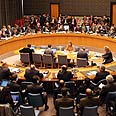
6 powers step up talks on Iran sanctions
British ambassador says discussions aimed at reining in Islamic Republic's nuclear program are 'very constructive'; French ambassador says they are going 'very well'
Six major powers trying to rein in Iran's nuclear program stepped up the pace of talks on possible new sanctions against the Islamic Republic on Thursday.
Ambassadors from the US, Russia, China, Britain, France and Germany met behind closed doors about 15 hours after wrapping up a more than three-hour session Wednesday evening. It was their third meeting in a week.
Afterward, Britain's UN Ambassador Mark Lyall Grant said the talks were "very constructive" – echoing the words of the Russian, Chinese and French ambassadors on Wednesday. France's UN Ambassador Gerard Araud said talks were going "very well."
Diplomats caution, however, that tough negotiations will be needed to bridge differences between Moscow, Beijing and the Western powers.
The United States and its allies are pressing for quick adoption of an array of tough sanctions to pressure Iran to start negotiations on its nuclear program, which they suspect is aimed at producing nuclear weapons. Senior US military and intelligence officials said Wednesday that Iran could amass enough nuclear material to build a bomb in about a year.
Russia and China are still hoping that diplomacy will lead Iran to the negotiating table and have indicated they will only agree to much weaker measures if Tehran refuses.
The six countries have adopted a "dual-track" strategy of diplomatic engagement with Iran and pressure through sanctions. But their emphasis is starkly different.
China's UN Ambassador Li Baodong said Wednesday the consultation would "focus on diplomacy."
After a summit of the leaders of Brazil, China and India in Brasilia on Thursday, Brazil's foreign minister said there was an "affinity" between his nation's stance against new sanctions on Iran and the positions of China and India. Brazil is currently serving a two-year term on the UN Security Council.
Foreign Minister Celso Amorim said Brazil believes it is still possible to try for a negotiated agreement with Iran "and our impression is that the vision of both (China and India) on the effectiveness of the sanctions is questionable and that sanctions affect only the most vulnerable people and not the leaders."
"There was an exchange of ideas on how to start the process – what is the best way to find a peaceful solution," Amorim said, but he gave no details.
Asset freeze and travel ban
The ambassadors are discussing a draft UN resolution circulated by the US in January, with some changes proposed by Britain, France and Germany.
The resolution focuses on five areas, according to a UN diplomat familiar with the talks:
- Strengthening the existing arms embargo by extending it to ban the import of light weapons;
- Targeting Iran's powerful Revolutionary Guard, which controls companies and organizations that have links to weapons proliferation;
- Curtailing new investments in Iran's lucrative energy sector;
- Strengthening sanctions on Iran's shipping industry by authorizing the seizure of suspect cargo at sea and barring insurance to entities that are involved in proliferation activities to try to curtail their activities.
- Strengthening financial measures that now call on all countries "to exercise vigilance" in entering into new trade commitments with Iran, including granting export credits, guarantees or insurance.
The proposed sanctions resolution would also add new names of individuals and entities to a list of those subject to an asset freeze and travel ban for their proliferation-related activities, the UN diplomat said.
According to the UN diplomat who spoke on condition of anonymity because talks are private, China and Russia want much weaker and narrower sanctions than those in the US draft.
For instance, while the Western nations would like tough sanctions on the Revolutionary Guards, others argue that targeting an entire organization is wrong and that some Revolutionary Guard companies are legitimate, the diplomat said.
Although Obama has called for Security Council action in weeks, the diplomat and others say negotiations will be tough because the gap between the two sides is wide, and it's much more likely that a resolution won't be put to a vote until June.
That would avoid any conflict with the five-year review of the Nuclear Nonproliferation Treaty, the cornerstone of global efforts to prevent the spread of nuclear weapons, in May and would also avoid embarrassing Lebanon, which holds the presidency of the UN Security Council in May and has indicated its opposition to sanctions against Iran. The presidency passes to Mexico on June 1.










